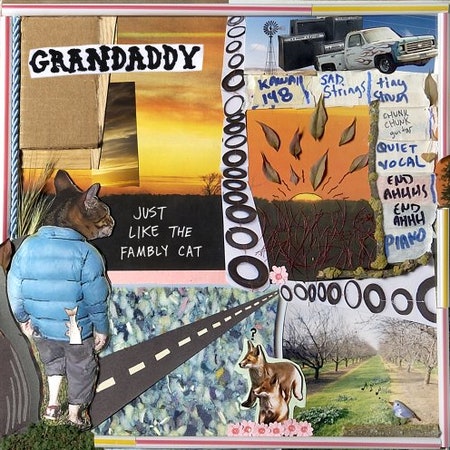For the latest and apparently lastest in Grandaddy's catalog of creatively spelled album titles, frontman Jason Lytle turned to Ma Joad. "We was always one thing-- we was the fambly-- kinda whole and clear," says The Grapes of Wrath matriarch. "An' now we ain't clear no more." Modesto, Calif.-based Grandaddy, hailing from the same illusory promised land barely endured by John Steinbeck's Okies, retravel their signature space-pop terrain on fourth and final album, Just Like the Fambly Cat, demanding and often rewarding attention like so many prose poems about goddamn turtles.
Throughout Fambly Cat, Lytle's slow-build home-studio sonics offer subtle textures, whether the sad-eyed Atari beeps and Books-ish spoken-word samples of opener "What Happened..." or the dolorous opera singer pledging never to return in bittersweet finale "Shangri La (Outro)". Wherever there's a man inventing a guitar-based crunchy cereal, Lytle'll be there. Wherever a starchild's strumming acoustic and Peter's robbing Paul to pay Korg, you'll see Lytle's formerly bearded mug.
It's all vaguely familiar, but Lytle's fine-grained production pops a freshmaker or two into the mix. Tracks fold and refold onto themselves, sprouting unexpected codas, like the "Wicked Game" acoustic-guitar noodles at the end of energetic teenage-dream slapstick (and first single) "Jeez Louise", or the growl'n'yawp pet sounds at the end of the hazy "The Animal World". Four songs clock in at over six minutes, each featuring leisurely escalating swoonscapes rather than proggish movement changes or noodly improv. So the honeyed verses of "Where I'm Anymore" melt into a lush, 1970s AM-pop "meow-meow" chorus, which in turn eddies into surging guitar.
Lyrically, there's some endearing nonsense about the journey of a lost cat, but clearly it's Grandaddy that's really moving on. In his sweetened, beatific falsetto, Lytle describes faded summers, ironic ice cream trucks, fear of failure, and a prodigal son's love for his mother, once dipping into the dark void ("Nothing rad/ Nothing right/ Nothing I'll feel tonight") of pathological intoxication. Sometimes it's as if Lytle is singing out of nostalgia for a future that never came true: A world where Grandaddy ironed out its inessential bits and made an album comprising solely the band's many moments of glossy low-key bedazzlement-- where Pete Yorn and Saves the Day opened for them.
"I don't wanna be the story of the guy who tried," Lytle sighs flatly on "Guide Down Denied", the turning point of the album. From here on, the songs find silver linings and beguiling hooks. Simple truths come hard-earned, given depth by Lytle's luminous instrumental touches: "You don't have to be alone anymore," he suggests on "Campershell Dreams", and it's like a fucking revelation. Energetic "Disconnecty" looks ambiguously at solo flight, while "This Is How It Always Starts" shimmers into whiskey oblivion, before doom-laden "Shangri-La (Outro)" confirms, dude's never coming back.
No grapes, no wrath, but, like Steinbeck's lil' novel, Just Like the Fambly Cat is a quest for hope. On the disc's catchiest song, perky "Elevate Myself", Lytle finally ceases his self-torture, eschewing the pop conveyor belt in favor of self-actualization: "I'd rather make an honest sound/ And watch it fly around/ And then be on my way." It's not how the world ends, but it's how a fambly-- of men, of fans, and of robots-- quietly crumbles. No more false Shangri-La: Like any self-respecting technophobe savant, Lytle's moving to Montana.
